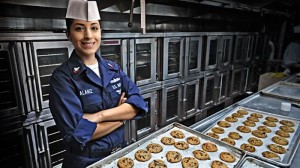Food Processing Careers Outlook
 The food industry has changed dramatically in a very short time. Frozen foods, for example, were a novelty in the early 1950s. Now, millions of homes in the United States use frozen foods in some form. Many products that formerly could only be processed by hand can now be completely processed by automated equipment, so it is possible for a food to be harvested, processed, and packaged without ever being touched by human hands. Some areas of the food industry have become virtually obsolete, while others have gained in importance. It is difficult to predict what the dynamic food industry will be doing in another 30 years, but one thing is certain: People will always need to eat.
The food industry has changed dramatically in a very short time. Frozen foods, for example, were a novelty in the early 1950s. Now, millions of homes in the United States use frozen foods in some form. Many products that formerly could only be processed by hand can now be completely processed by automated equipment, so it is possible for a food to be harvested, processed, and packaged without ever being touched by human hands. Some areas of the food industry have become virtually obsolete, while others have gained in importance. It is difficult to predict what the dynamic food industry will be doing in another 30 years, but one thing is certain: People will always need to eat.
The growth of the food industry has not happened simply because people have to eat or because of the population increase. This extra growth has resulted from many things—good management at all levels, teamwork among all segments of the food industry, heavy investment in research, new and improved products, modernization of plants, new equipment, automation, and a great deal of advertising and promotion.
Employment in the food processing industry is expected to grow about as fast as average through 2014, according to the U.S. Department of Labor. Job growth will be concentrated among production workers, who hold 52 percent of processing jobs. The sorting, cutting, and chopping tasks performed by these workers have proven difficult to automate, so employment among hand workers will rise along with the growing demand for food products. Automation is likely to decrease opportunities for machine operators and increase jobs for industrial machinery mechanics. Job prospects for food technologists and scientists are expected to be good as more attention is focused on the role of food in diet and health; efforts are made to improve food safety, including the risk of bioterrorism; and solutions are sought for major issues such as increasing population, loss of arable land, deforestation, the availability and cost of usable water, pollution, and climate change.
The food processing industry will be particularly challenged in several areas. Food product labeling will be completely overhauled, there will be a greater demand for food packaging that uses up fewer resources and for packaging that can be reused or recycled, and there will be a continuing demand for increased nutritional value in processed foods.
Related Careers:
- Bakery Workers
- Beverage Industry Workers
- Brewers
- Canning and Preserving Industry Workers
- Chemical Engineers
- Confectionery Industry Workers
- Cooks and Chefs
- Dairy Products Manufacturing Workers
- Enologists
- Family and Consumer Scientists
- Food Service Workers
- Food Technologists
- Health and Regulatory Inspectors
- Meat Packing Workers
- Meatcutters
- Packaging Engineers
- Packaging Machinery Technicians
- Restaurant and Food Service Managers
- Toxicologists
